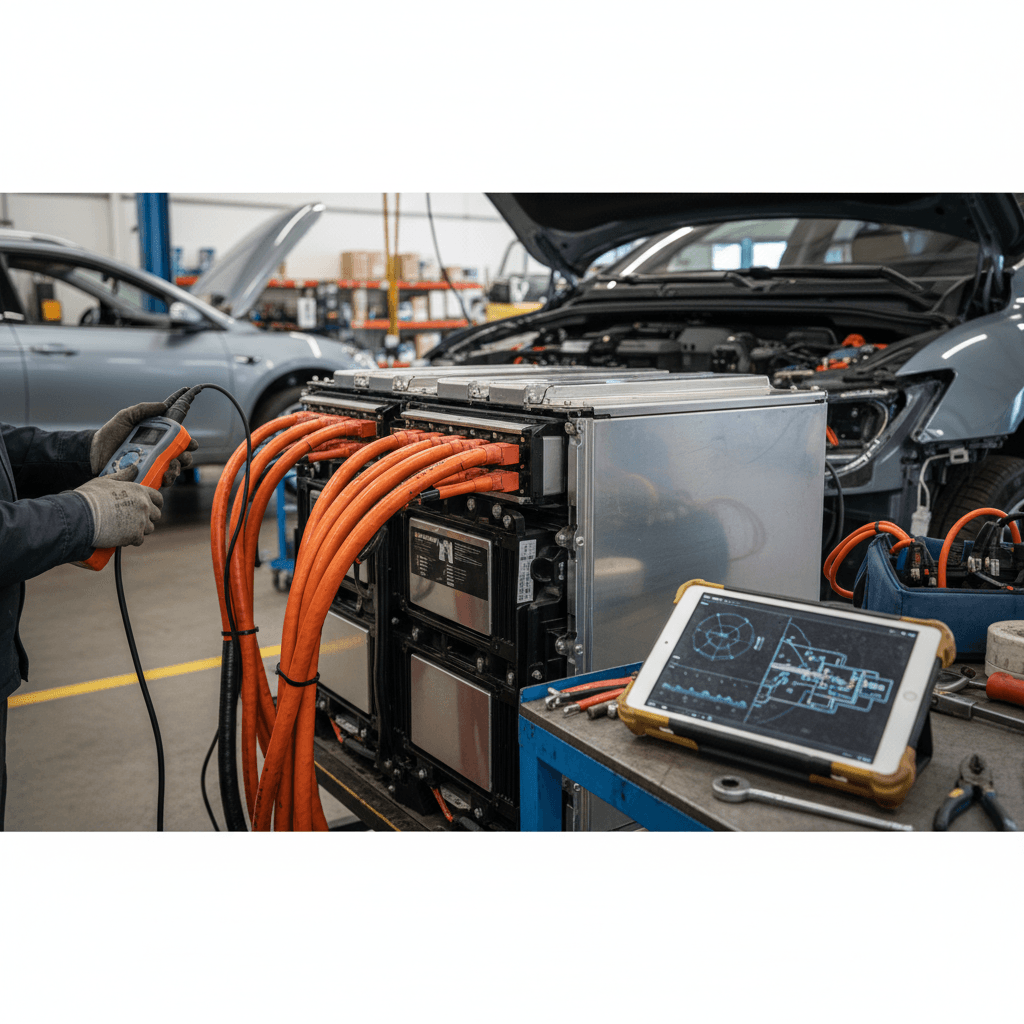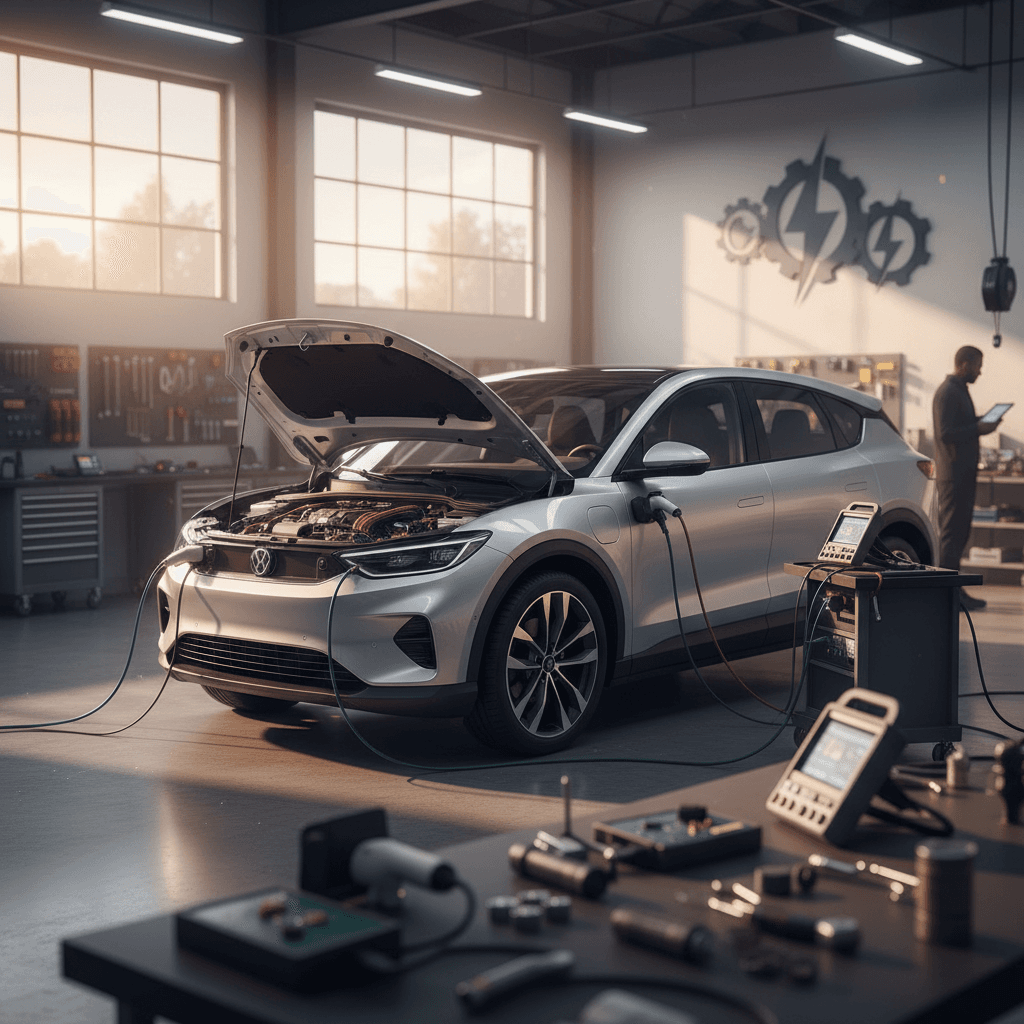You don’t Google “car electrical shops near me” because you’re bored. Something in your car has gone dark, beeped, flashed, or flat‑out died. Maybe it’s a flickering headlight on your gas sedan; maybe it’s a mysterious “Service high voltage system” message on your EV. Either way, you’re trying to figure out who, exactly, is qualified to touch all those wires without turning your car into a very expensive paperweight.
The short answer
Why you’re searching “car electrical shops near me”
- Warning lights you don’t recognize (battery, charging system, traction control, airbag).
- Strange electrical behavior like screens rebooting, windows acting possessed, or the car refusing to “wake up.”
- Charging problems on an EV or plug‑in hybrid, stops mid‑charge, won’t start charging, or gives an error at public stations.
- Range or starting issues that feel electrical, not mechanical.
On an internal-combustion car, “electrical” usually means the 12‑volt system: battery, alternator, fuses, wiring, sensors. On a hybrid or EV, you still have all of that plus a high‑voltage system that runs between roughly 200–800 volts. That second layer is where things get both powerful and slightly terrifying, and not every neighborhood shop is ready for it.
What car electrical shops actually do
Typical services at car electrical repair shops
Most “auto electrician near me” search results will fall into one of these buckets.
12‑volt battery & charging
Testing, replacing, and wiring around your 12‑volt battery and alternator.
- Parasitic draw testing
- Alternator/charging system tests
- Battery replacements, terminals, wiring
Lighting & accessories
Anything that blinks, flashes, or glows.
- Headlights & taillights
- Interior lights, power seats, windows
- Aftermarket stereos, alarms, remote start
Diagnostics & modules
Electronics with brains attached.
- Scan‑tool diagnostics for fault codes
- ECU/BCM replacement & programming (where supported)
- Sensor troubleshooting (ABS, parking, airbag)
For traditional gas cars, a capable auto electrician can handle nearly every electrical complaint: from your radio cutting out to a dead alternator. Hybrids and EVs complicate the picture. They add inverters, onboard chargers, DC‑DC converters, and massive battery packs, all of which require manufacturer procedures, special safety gear, and often factory software access.
High voltage is not a DIY project
Can regular car electrical shops handle EVs?
What most shops can do on an EV
- 12‑volt issues – dead 12‑volt battery, corroded terminals, blown fuses.
- Interior electronics – infotainment glitches, window switches, power seat faults.
- Lighting problems – headlight/taillight issues, turn signals, brake light circuits.
- Basic scan‑tool checks – reading and clearing generic fault codes.
These are essentially the same jobs they do on gas cars, just wrapped in a more futuristic shell.
What needs an EV‑savvy specialist
- High‑voltage fault messages – “Service high voltage system,” “HV battery error,” “Charging system fault.”
- Range or rapid‑degradation complaints tied to the main traction battery.
- Onboard charger, DC‑DC converter, or inverter failures.
- Thermal management issues – coolant leaks into the battery pack, battery overheating, or charge‑rate throttling.
Here you’re into territory where the right training and diagnostic tools matter more than the number of toolboxes in the bay.

How to tell if a shop is EV‑ready
How to find a reliable car electrical shop near you
Step‑by‑step: finding the right shop near you
1. Start with location, but don’t stop there
Typing <strong>“car electrical repair near me”</strong> or <strong>“auto electrician near me”</strong> into Maps is fine. What matters next is how you filter those results, rating, reviews, and whether they even mention hybrids or EVs.
2. Read reviews for electrical specifics
Look for reviews that mention diagnosing tricky electrical issues, not just oil changes. Phrases like “found a short,” “fixed my wiring,” or “solved a battery drain” are what you want to see.
3. Check the shop’s website for EV or hybrid mention
If they call out <strong>EV</strong>, <strong>hybrid</strong>, or <strong>high‑voltage</strong> work specifically, that’s a good sign. If their site reads like it stopped updating at the carburetor era, treat them as 12‑volt only.
4. Call and describe your exact problem
Give them the warning messages you’re seeing, the car year/model, and whether it’s hybrid, plug‑in hybrid, or full EV. Their response will tell you quickly if they’re guessing or actually know the platform.
5. Ask how they handle high‑voltage safety
A serious shop will mention lock‑out/tag‑out procedures, insulating gloves, or OEM repair information. If they dodge the question or sound confused, choose someone else for HV work.
6. Confirm estimates, timelines, and parts access
Electrical diagnostics can take time. You want clarity on diagnostic fees, how long they’ll need the car, and whether they can actually source the parts they might find are faulty.
Key questions to ask before you book
Questions for any car electrical shop near you
Use these to separate true auto electricians from generalists guessing their way through your EV.
| Question | What a confident answer sounds like | Red flag answer |
|---|---|---|
| Do you regularly work on my make and model? | “Yes, we see a lot of these. We’ve done electrical work on this platform before.” | “We’ve never seen one, but how different could it be?” |
| Do you work on hybrids or EVs? | “We handle 12‑volt systems on EVs and partner with specialists for high‑voltage issues.” | “Sure, electricity is electricity.” |
| What’s your diagnostic fee? | “We charge a flat X for initial electrical diagnostics and will call before any further work.” | No clear answer or “We’ll see when it’s apart.” |
| Will I get a scan report or notes? | “Yes, we can show you the codes and what we tested.” | “Just trust us, we’ll take care of it.” |
| Are your parts OEM or equivalent quality? | “We use OEM or high‑quality equivalents and can tell you which for each repair.” | “Whatever is cheapest on the internet.” |
You don’t need to be a technician; you just need a good checklist.
Common EV and hybrid electrical problems
Where electrical complaints usually start
One of the oddities of EV ownership is that many breakdowns blamed on the “big battery” are actually caused by the humble 12‑volt system. When the 12‑volt battery or DC‑DC converter misbehaves, the car’s computers throw dramatic warnings, disable features, or prevent the car from shifting into gear. It feels catastrophic, but the root cause can be comparatively simple.
Typical electrical problems, what a local shop can (and can’t) tackle
Use this to decide where to call first.
Problems a local electrical shop can usually handle
- Dead 12‑volt battery – testing, replacement, and checking for parasitic drains.
- Lighting issues – flickering headlights, LED failures, brake‑light faults.
- Accessory failures – screens, audio, power seats/windows, keyless entry glitches.
- Simple sensor faults – parking sensors, some ABS/traction control issues.
Problems for EV specialists or dealers
- High‑voltage battery errors – rapid range loss, cells out of balance, pack overheating.
- Charging‑system faults – car won’t DC fast charge, or refuses some public chargers.
- High‑voltage component failures – onboard charger, inverter, or DC‑DC converter faults.
- Battery recalls or warranty work – these typically require a franchised dealer or OEM‑approved partner.
When to stop driving immediately
Costs: how much car electrical repair near you might run
Electrical work is time and brain‑heavy. You’re often paying less for the part than you are for the hours of diagnosis it took to find it. That’s doubly true on modern hybrids and EVs, where access can be tight and procedures are scripted by the manufacturer.
Typical price ranges for car electrical repair
Ballpark figures for U.S. shops in 2025, actual numbers vary by region, brand, and how deep the fault goes.
| Job type | Who usually handles it | Typical range (USD) |
|---|---|---|
| 12‑volt battery test & replacement | Local auto electrical shop or tire chain | $150–$350 depending on battery size and location |
| Diagnosing basic electrical issue (1–2 hours) | Auto electrician or general repair shop | $150–$300 diagnostic fee |
| Alternator/charging‑system repair (ICE car) | Auto electrical or general mechanic | $400–$1,000 parts + labor |
| Infotainment/cluster replacement | Dealer or specialist | $800–$2,000+ including programming |
| EV 12‑volt/DC‑DC fault diagnosis | EV‑savvy shop or dealer | $200–$400 initial diagnostics |
| High‑voltage battery module or pack work | Dealer or OEM‑approved EV specialist | $1,000–$10,000+ (often warranty or recall if covered) |
Think of these as “order of magnitude,” not quotes.
Good news for used‑EV shoppers
Where Recharged fits into your electrical problem
Recharged doesn’t operate as a general “car electrical shop near me” in the sense of fixing your taillight tomorrow. What we do is remove a huge chunk of uncertainty before you ever end up on the side of the road with a cryptic warning message.
How Recharged helps with electrical peace of mind
Before, during, and after you buy a used EV.
Recharged Score battery diagnostics
Every EV we list comes with a Recharged Score Report that includes verified battery health and charging behavior. You see how the car has actually been used, not just how the paint looks under the lights.
EV‑specialist guidance
Our EV specialists can help you interpret warning lights and battery‑health info while you’re shopping, so you don’t buy into someone else’s electrical headache.
Trade‑in, financing, and delivery
When you’re ready to move on from an aging or electrically temperamental car, Recharged can buy your EV, take it on consignment, or help you trade in, all with a fully digital process and optional delivery from our Richmond, VA Experience Center.

A practical combo
Frequently asked questions about car electrical shops near me
Car electrical repair & EV shop FAQ
Bottom line: choosing the right electrical shop for an EV
When you type “car electrical shops near me” into your phone, the map doesn’t tell you who understands 800‑volt battery packs and who still thinks Bluetooth is witchcraft. That’s your job, and it starts with a few pointed questions about experience, EV training, and safety procedures. Let local auto electricians handle what they do best, 12‑volt systems and accessories, while you reserve high‑voltage surgery for EV‑savvy specialists and dealers. And if you’re tired of gambling on someone else’s electrical past, that’s where Recharged comes in: helping you into a used EV with the battery health verified, the pricing grounded in reality, and a human being on the other end of the chat who can talk you through every warning light you’re worried about.



